This post may contain affiliate links. See our disclosure policy.
This Sally Lunn bread recipe comes to us from my great-grandmother. This sweet bread is a family favorite, passed down through generations, and is always warm, sweet, and satisfying.
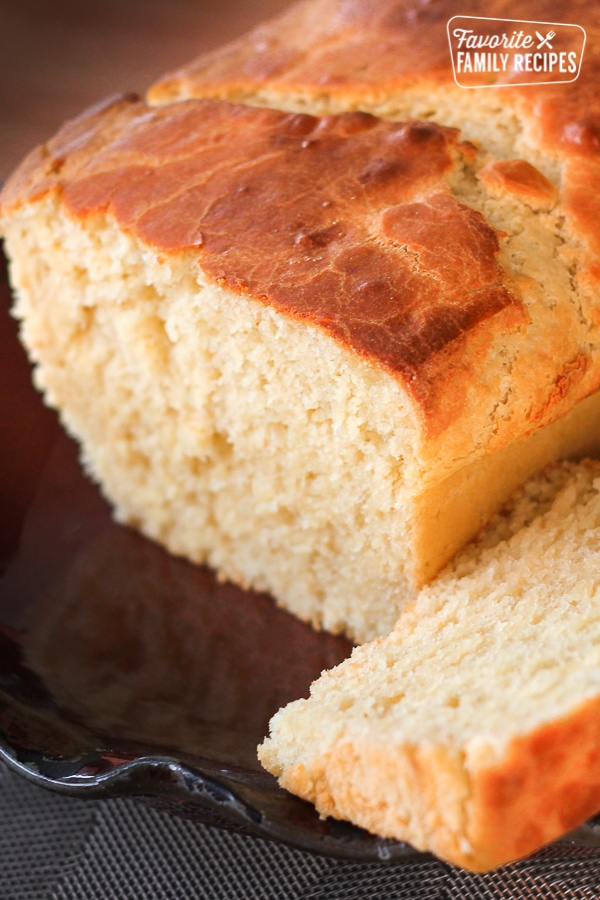
Featured with this recipe
This Sally Lunn bread is a sweet and savory bread that comes together quickly and easily with a few special tricks in the dough. This is a bread dough that you do not need to knead on your countertop. It is sweet, easy, and tastes absolutely delicious with butter and homemade jam!
It is the perfect bread that can be made in less time and still have the texture and flavor that we all love to eat. This bread is special from the start to the end! You will love how fun this is to make, and will see the difference between Sally Lunn bread and other homemade bread alike.
What is Sally Lunn Bread?
A Sally Lunn-type bread is a sweet bread similar to a brioche or a teacake. This recipe goes back centuries, to the 1700s when it is believed to have originated in the spa town of Bath in southwest England. However, details surrounding how it came to be are a bit unknown. One theory is that this recipe got its name from the title “Soleil et lune” which is French for “sun and moon”, representing the golden crust and fluffy white interior of the bread.
The Sally Lunn Eating House in Bath, England claims the recipe was brought to the region in the late 1600s by a refugee named Solange Luyon, who became known as Sally Lunn. We aren’t sure which theory to believe, but we know this: Sally Lunn bread is scrumptious and we love it!
Sally Lunn Bread Ingredients
There are a few more ingredients compared to other homemade bread, but this is what makes this bread stand out and apart from the rest. It is simple to make with just the right amount of sweetness to make this bread even better! See the few ingredients and ways this Sally Lunn bread is a little different than your traditional homemade bread recipe.
- Hot milk – It sounds different, but this recipe calls for warming the milk to about 120 degrees Fahrenheit. Place your liquid measuring cup in the microwave or heat on the stovetop until warm enough. You can use a meat or candy thermometer to check the temperature.
- Butter – In a saucepan, your butter will melt and break down in the milk and sugar.
- Sugar – Added in for sweetness and will be melted together in the liquid milk mixture.
- Salt – This helps the bread rise and gives it structure and blends the flavors together.
- Dry yeast – Use active dry yeast to help this Sally Lunn bread rise.
- Warm water – Mix this with the yeast to help activate the bread dough.
- Eggs – Eggs are a great agent that helps the dough rise and helps soak in the liquid, giving it that spongy texture.
- White flour – Bread needs flour in order to stretch the dough and add it for thickness.
How to Make Sally Lunn Bread
No need to knead this bread! It’s so easy to make. All you do is stir together ingredients, let it rise, then bake! You can even let it rise right in your baking pan, or transfer it from a bowl to a pan, whichever method you prefer.
- Mix together – Mix the hot milk, butter, sugar, and salt in a large bowl and let cool to lukewarm.
- Dry yeast mixture – Stir the yeast into the warm water and let it stand for 5 minutes to dissolve. Add the dissolved yeast and the eggs to the first mixture and beat vigorously.
- Making soft dough – Gradually add the flour. Cover and let rise in a warm place until about double in bulk. Spoon the mixture into a buttered loaf pan. Preheat oven to 350. Bake for 50 minutes.
Suggestions for this Recipe
This is buttery with a hint of sweet flavor and is soft and spongey. This is known to be a large bun or tea cake that is loved by all. Here are a few suggestions and tips to help make this sweet bread even better!
- Baking pan – You will need to use an oversized/large loaf pan, like a Pullman loaf or tube pan. This is not the same normal bread dough and the dough will spill over. Use a special bread pan and not a regular loaf pan, unless you use less batter bread.
- Loaves – We always bake this recipe into a loaf, but you can bake them into roll form or mini bread loaves.
- Jam – Serve this bread with butter, honey, honey butter, and jam. We love this Fresh and Easy Strawberry Jam or this Raspberry Peach Freezer Jam recipe.
- Slicing bread – When slicing bread, use a serrated knife to make a clean and easy cut each time.
- French toast – Use this bread to make french bread. It is sweeter and thicker with sponge-like bread that is great for making french toast and soaking in the cinnamon flavor.
“I’ve been making This bread for years as it’s a family favorite. I’ve always used an angel food cake pan for baking. Works beautifully no matter how much it rises and easy to slice.”
-Gina
Frequently Asked Questions
The Sally Lunn Eating House is in Bath, England started all the bread recipes. It is assumed that the bread recipe was brought to Bath in the 1680’s by Huguenot refugee named Solange Luyon. Later they think that her name was changed to Sally Lynn.
Sally Lunn Bun tastes like a soft, spongey, delicate bread with a sweet and buttery flavor. Enjoy this bread with jam, honey, or butter. It is similar to a French brioche.
A Sally Lunn bath bun has a sticky top laced with sugar crystals and fruit compared to a smaller and flatter Sally Lunn. A lot smaller and flatter than the Sally Lunn, the Bath Bun has a sticky top laced. The bath bun looks similar to a soft bread roll.
This Sally Lunn bread is a special bread that is overly soft. The secret to this soft bread is the water and fats in the bread. This will help keep the bread stay fresh and spongy longer.
Storing and Freezing Homemade Sally Lunn Bread
Sally Lunn bread usually doesn’t last that long. If you are lucky enough to have leftovers, place the uncut or sliced bread into a ziplock bag or an airtight container for up to a week or if the bread begins to harden.
- Freezing – Sally Lunn Bread freezes beautifully! Freeze tightly covered or in a freezer-safe bag and it’ll stay nice and fresh in the freezer for a couple of months.
- Frozen slices – For even more ease you can slice the loaf and then freeze it. Then all you have to do is pull out a couple of slices at a time, toast them up, and enjoy with a slather of butter and jam.
More of our Favorite Bread Recipes
Most of our meals just don’t feel complete without a side of warm, fluffy rolls or bread. Bread in general can be scary to make, but it really is a simple process for each recipe. Here are a few of our very favorite bread recipes to try!
How to Make Sally Lunn Bread
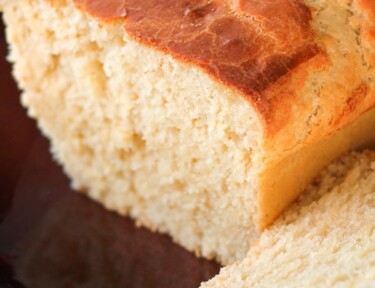
Sally Lunn Bread
Equipment
- Loaf pan
Ingredients
- 1 cup hot milk
- 1/4 pound butter
- 1/4 cup sugar
- 1 teaspoon salt
- 1 package dry yeast
- 1/4 cup warm water
- 3 eggs
- 3 1/2 cups white flour
Instructions
- Mix the hot milk, butter, sugar, and salt in a large bowl and let cool until lukewarm. Stir the yeast into the warm water and let it stand for 5 minutes to dissolve. Add the dissolved yeast and the eggs to the first mixture and beat vigorously.
- Gradually add the flour. Cover and let rise in a warm place until about double in bulk. Spoon the mixture into a buttered loaf pan. Preheat oven to 350. Bake for 50 minutes.
Notes
How to Freeze Sally Lunn Bread
- Freezing – Sally Lunn Bread freezes beautifully! Freeze tightly covered or in a freezer-safe bag and it’ll stay nice and fresh in the freezer for a couple of months.
- Frozen slices – For even more ease you can slice the loaf and then freeze it. Then all you have to do is pull out a couple of slices at a time, toast them up and enjoy with a slather of butter and jam.
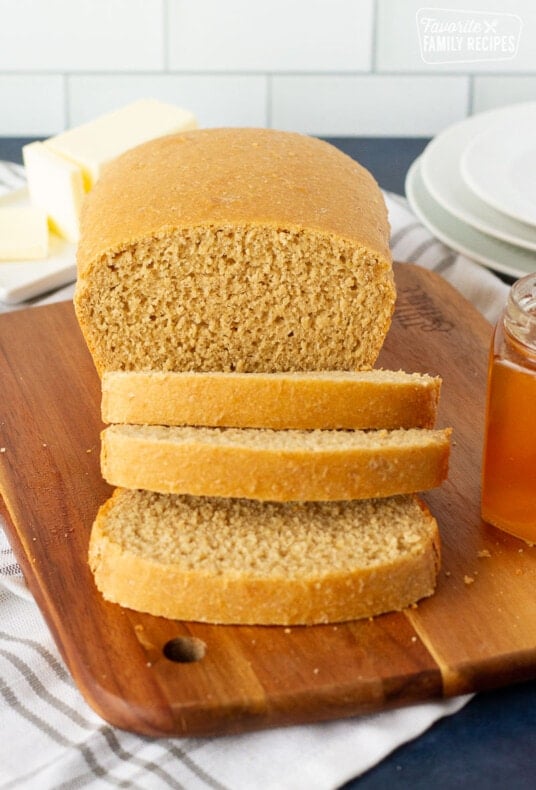
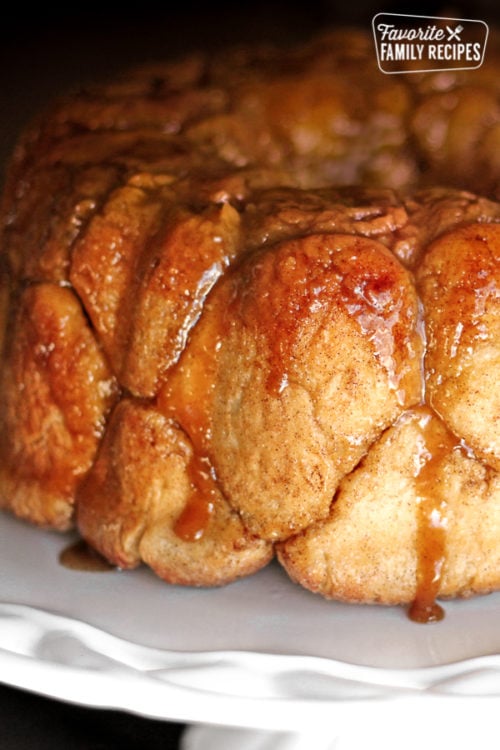
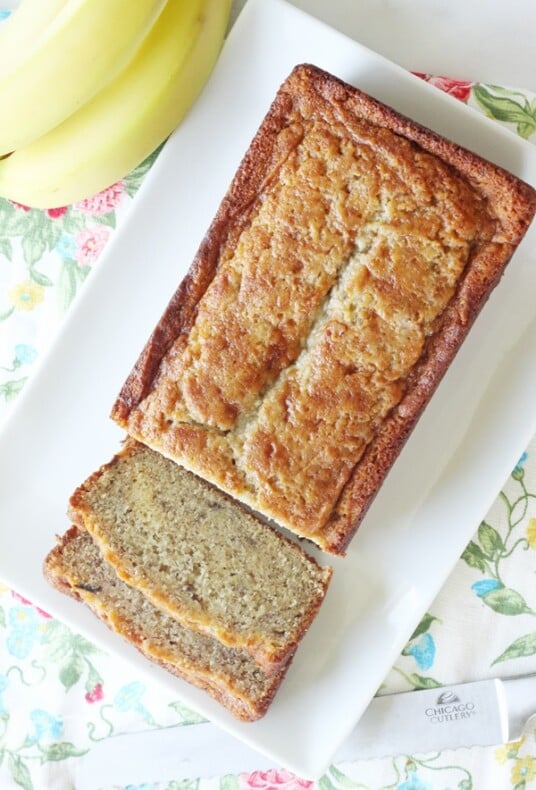
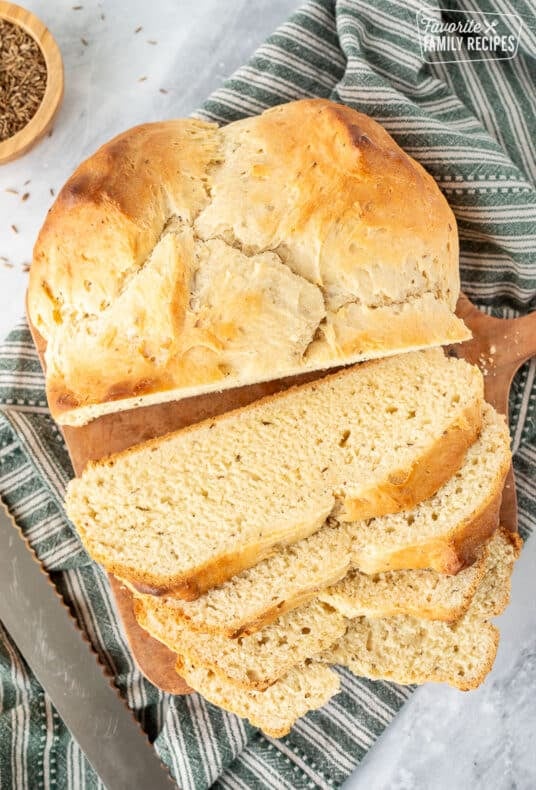
I have four other recipes for batter breads, and none of them require a second rise, so I was confident in that regard. My bread [baked in a tube pan] was a tad over-done at 35 minutes, so fifty minutes would have ruined it. I am sorry I left it at a friends house, so I won’t be able to try it as toast. Not bad for a colonial bread, but definitely boring for me, and it would have been much better had I whipped up something sweet to put on top. I think this recipe was everything its supposed to be. This is not a reflection of your recipe, but more that the bread just didn’t wow me.
Hi,
I made the recipe in a bread machine. Part way through I had to put in more then 2 c.of flour as it was soup. This is just a small batch.1x.
Have been playing the recipe for adding more floùr almost 3 cup.
Perfect Sally Lunn bread!
To the 800 people who asked about a second rise, the answer is NO, you don’t need a second rise. I made this for the first time today precisely because it seemed so easy and it was. My only variation was that I used bread flour because I wanted to use up what I had. It came out akin to light and airy biscuits in texture. I’m also curious to try this by giving it a good knead to see what results I get. That said, follow the recipe the way it’s written and you won’t be disappointed.
Delicious! More like cake than bread. I followed the one-rise instructions. It rose big and beautiful in the oven and did not overflow my 4.5″x8.5″ (measured at the bottom) loaf pan. I let it cool in the pan for 10 minutes or so before turning it out because it seemed a little delicate. I have been looking for a recipe for “Mickey Cake” a la Maurice Sendak’s “In the Night Kitchen”. I think this is the one! Milk in the batter, milk in the batter, we bake cake and nothing’s the matter! Thank you for sharing your recipe.
For those that are having a hard time or would like more history, this buy is really good. He may answer your questions. https://www.youtube.com/watch?v=w36CYveyCxU
The Williamsburg Cookbook (8th printing, 1988) recipe I have always used has two rises, once for batter ingreds and again when in baking pan.
I cannot imagine one rise only and not willing to test theory!!
You’re not willing to spend a few cents to “test” theory? It worked fine for me.
Do not use a “regular” loaf pan, because you will have a smoky mess in your oven. You need to use an oversized/large loaf pan, like a Pullman loaf pan, because unlike a normal dough the mixture is more of a batter and it will spill over.
Forgot to rate it….
Thanks for the 5-stars! 😀
I noticed your “one rise” comment. If so, then why not let it rise in the loaf pan, then toss it in the oven? I did nothing but transfer the dough from oiled bowl to pan….and bake. It’s good. Will bake it again.
You bring up a very good point! You can definitely try letting it rise in the loaf pan. Thanks for the suggestion to make it easier!
I’ve been making This bread for years as it’s a family favorite. I’ve always used an angel food cake pan for baking. Works beautifully no matter how much it rises and easy to slice.
I would think that you would need to let it rise a second time then bake. Never heard if not doing that working with yeast.
Is this a single-rise bread? I have trouble with the ‘rise’ part, so if there’s only one, maybe my chances are improved?
Yes, you only allow it to rise once. It is a super easy bread!
I just made this bread and it was great! I was wondering if this recipe would work using other flour, for example white whole wheat? Would I have to make any changes using white whole wheat flour? I’m really new to bread making. Thank you!
I haven’t made this bread with wheat flour – but I think white whole wheat flour would work great. You may not need as much flour in the recipe. I would hold out one cup of flour and mix it in a little at a time. You don’t want the dough to become too stiff or the bread will turn out dry.
Holy crap mine is humongous. Don’t know if it will last the whole cooking time.
I am going to give it a go in the bread machine!
This bread is delicious. I made one in my bread machine and it ran on the outside of the machine but it was eaten. Will this recipe work in bread machine? Thank you
We have never made this in a bread machine before — I am guessing from your experience it didn’t work too great? I don’t know how I would adapt the recipe to make it work better. If you try it again let us know how it turns out!
I have always made this on my “dough” cycle. Then I put it in my Pullman Pan to rise and bake.
In New Zealand a sally lun is a large sweet bun with raisins inside and topped with pink frosting or mock cream
I didn’t get a doughy mixture. Should I add more flour to it or is it supposed to be that way?
Yes, try adding a little more flour until its the right consistency.
Wonderful recipe. My husband, and BOTH teenaged kids love this. I only had self rising flour so I just omitted the yeast. I can’t wait to try it with the “real” ingredients! I will have to at least double the recipe so hubby can take some to work and the kids can have some to share on the bus ride in the morning.
@Poweronyourvcr- it just needs to be very hot– not necessarily to a boil.
the ingredients to this are so simple- i've been looking for perfect bread recipes and i'm excited to try this one. how hot should the milk be? i've read if it boils it can ruin the yeast?
http://contemporaryattempts.wordpress.com/
@Rachel– no worries! Yes, you will want to heat the milk up.
It asks for hot milk, does that mean milk that has literally been heated? Oh boy, do I feel like a fool asking that!
Thanks for your yummy recipes!
Looks delicious! Bread is truly one of my favorite foods to eat! Thanks for sharing a family treasured recipe.
http://www.lifeofamodernhousewife.com
You don't need to let it rise a second time once in the pan?
I went strictly by the recipe including one rise and exact amount of flour.. yes it seemed liquidy. But I stuck with the recipe and it just turned out fine. So just do it.. stop overthinking.